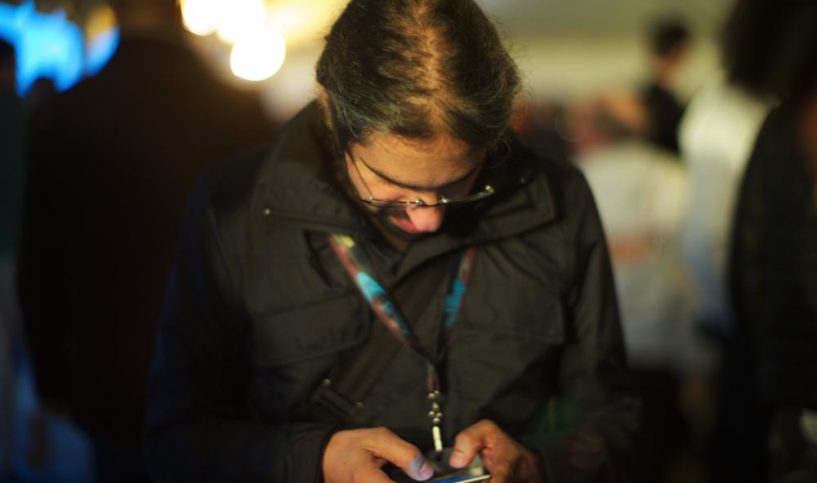You’d be forgiven for thinking of Sultan Al-Qassemi as only the “twitter reporter” but there’s a lot more to the man than his social media handle. A fellow at the Dubai School of Government, he has written articles for The New York Times, The Financial Times, Foreign Policy, Open Democracy, The Independent, The Guardian and Gulf News. He also holds down a 9-5 job in the family office in Sharjah and established the Barjeel Art Foundation in Sharjah in 2010.
But there is no denying the pivotal role he played in the uprisings across the Arab world in 2011. He was integral in letting the word know what was happening during this tumultuous time. He translated Arab news sources into English so the whole world could understand what was happening. There are stories of him tweeting once every 45 seconds, and how he continued tweeting even while attending a wedding. As analysts still try to put a value on the role social media played during the revolutions in Egypt, Tunisia, and more recently Syria, Al-Qassemi emerged as a news source all of his own, digesting local area happenings and reducing them to 140 character nuggets of news.
bazaar was honoured to be able to interview Sultan Al-Qassemi and learn a little more about the man behind the handle better known to the world as @SultanAlQassemi; a handle that earned him a spot in the best 140 twitter feed list generated by the Times, Al-Qaseemi is also recognized by Gulf Business magazine for being one of the top 100 most influential Arabs.
Why did you choose twitter as your main medium of communication? What do you like most about using twitter, and other social media channels?
I feel I didn’t choose twitter, I happened to be on it when the uprisings started in Tunisia back in December 2010. twitter allowed me to send out “news bites” as events were unfolding. Writing a blog would have taken around 30 minutes and in those days, every second counted.
Why do you think twitter played an integral role during the Arab Spring?
The Arab world saw an exponential growth in the number of people who used social media including Facebook and twitter, with the heavy censorship of state media the only avenue of communication for the masses was, and remains to be, social media.
Do you think that social media will continue to play a major role in change for the Middle East?
It is unlikely that Arab governments will ever understand that their news outlets are not trusted by a large part of the population, therefore people will continue to turn to social media to get alternative views, for breaking news and instant updates.
Did you always know you wanted to be a ‘twitter reporter’?
twitter is only five years old and I have had ambitions before it was founded. I don’t consider myself to be a twitter reporter, I translated episodes of the Arab uprisings and now use it to tweet my reading material. People also assume I agree with all I tweet, which is not the case, this is largely due to the fact that they are not used to the alternative opinions due to government controlled media.
Besides being a much-followed reporter via twitter, and social media conversationalist, what are some of your career goals?
I established the Barjeel Art Foundation in Sharjah in 2010 to promote art from the Arab world. So far we have had five major exhibitions showcasing masterpieces of modern and contemporary Arab art. I have also taught in university, which is something I look forward to going back to in the future.
Describe a typical day in the life of Sultan Al-Qassemi.
Many people don’t know I have a 9-5 job, a family office in Sharjah. I also started traveling a lot to speak about social media, reform and the Arab uprisings.
Do you see social media, specifically twitter, replacing traditional news sources?
Many news outlets, especially in the Gulf will die a slow death due to their inability to adapt to the changing environment that social media has caused. That said, social media is not always a trusted source, we are in need of the hierarchies of news organizations in many cases, but not all verify the news before carrying it.
Do you believe that social media channels such as twitter are objective mediums of news reporting?
Most of the individual users on twitter post their opinions so it is very much subjective. A few people like NPR’s Andy Carvin have established a niche of aggregating news from various sources and verifying it without including their opinions.
Are there any emerging social media channels that you are utilizing?
I am trying to use Google+ but it is still suffering from teething problems, which I hope they can sort out soon.
Do you think governments censor/will censor social media channels?
We have seen many users discouraged from posting their opinions on social media due to a campaign reminiscent of McCarthyism of post World War II USA (I had written a piece on this issue for Gulf News). Sadly, Gulf governments are using their outdated media laws to censor 21st century social media exchanges.
Do you see governments in the Middle East aligning themselves with social media channels in the future?
Many governments are already on social media; Bahrain is the most glaring example. Most officials have either public or private profiles. This is both a positive and negative development, it is too early to say how this will affect social media use in the medium to long term.
We once read that you were able to keep your followers up to date about what’s happening in Tahrir Square while you were at a wedding! How did that happen?
I was at a family friend’s wedding that I was obliged to attend although my mind was elsewhere. This was the Friday before Mubarak stepped down; I was watching Al Jazeera on my phone via 3G and tweeting the latest updates (it ended up costing me a lot of money but it was worth it.)
Finally, what does your twitter feed look like?
It is now swamped. I used to follow less than 130 people, now I am nearing 900. The truth is I felt guilty not following all these quality people before – most of whom I did not know were following me including presidential contenders, Egyptian members of parliament and major news reporters and intellectuals. I follow them so they are able to ‘direct message’ me if they need to, but I must admit my twitter experience is not better for it due to the sheer number of tweets I get.
Follow Sultan Al-Qassemi on Twitter @SultanAlQassemi. Images of Sultan are courtesy of Mohamed Nanabhay.










